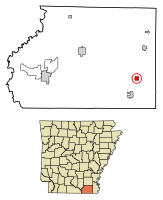Parkdale is a city in Ashley County, Arkansas, United States. The population was 277 at the 2010 census.[3]
Parkdale, Arkansas | |
|---|---|
 Location of Parkdale in Ashley County, Arkansas. | |
| Coordinates: 33°07′26″N 91°32′47″W / 33.12389°N 91.54639°W | |
| Country | United States |
| State | Arkansas |
| County | Ashley |
| Area | |
• Total | 1.02 sq mi (2.64 km2) |
| • Land | 1.02 sq mi (2.64 km2) |
| • Water | 0.00 sq mi (0.00 km2) |
| Elevation | 118 ft (36 m) |
| Population (2020) | |
• Total | 172 |
| • Density | 168.63/sq mi (65.12/km2) |
| Time zone | UTC-6 (Central (CST)) |
| • Summer (DST) | UTC-5 (CDT) |
| ZIP code | 71661 |
| Area code | 870 |
| FIPS code | 05-53510 |
| GNIS feature ID | 2404478[2] |
Geography
editAccording to the United States Census Bureau, the city has a total area of 1.0 square mile (2.6 km2), all land.[3]
History
editIn 1908, a Black man named Earnest Williams was lynched by a white mob who were "outraged" because he had used "offensive language".[4]
Arkansas Overall High School Basketball Championship
editIn 1979, Parkdale High School (later shut down and merged with Hamburg school district in 1994) won the Arkansas overall state championship in boys basketball, as a Class B school.
Ronald Claiborne scored 32 points for Parkdale in the overall championship game against Marmaduke. Parkdale finished 42-2 in 1979, including an overall tournament upset win over Pine Bluff. Parkdale's population at the time was approximately 471, as opposed to Pine Bluff's population of approximately 57,000.
The basketball championship by Class B Parkdale was later compared to the movie Hoosiers, where a tiny school wins the overall basketball championship in Indiana.[5]
Demographics
edit| Census | Pop. | Note | %± |
|---|---|---|---|
| 1910 | 383 | — | |
| 1920 | 284 | −25.8% | |
| 1930 | 371 | 30.6% | |
| 1940 | 278 | −25.1% | |
| 1950 | 385 | 38.5% | |
| 1960 | 448 | 16.4% | |
| 1970 | 459 | 2.5% | |
| 1980 | 471 | 2.6% | |
| 1990 | 393 | −16.6% | |
| 2000 | 377 | −4.1% | |
| 2010 | 277 | −26.5% | |
| 2020 | 172 | −37.9% | |
| U.S. Decennial Census[6] | |||
2020 census
edit| Race | Num. | Perc. |
|---|---|---|
| White (non-Hispanic) | 48 | 27.91% |
| Black or African American (non-Hispanic) | 117 | 68.02% |
| Other/Mixed | 4 | 2.33% |
| Hispanic or Latino | 3 | 1.74% |
As of the 2020 United States census, there were 172 people, 89 households, and 66 families residing in the city.
2000 census
editAs of the census[8] of 2000, there were 377 people, 141 households, and 100 families residing in the city. The population density was 374.0 inhabitants per square mile (144.4/km2). There were 158 housing units at an average density of 156.7 per square mile (60.5/km2). The racial makeup of the city was 29.44% White, 66.84% Black or African American, 0.27% Native American, 1.33% from other races, and 2.12% from two or more races. 2.65% of the population were Hispanic or Latino of any race.
There were 141 households, out of which 30.5% had children under the age of 18 living with them, 38.3% were married couples living together, 28.4% had a female householder with no husband present, and 28.4% were non-families. 25.5% of all households were made up of individuals, and 14.9% had someone living alone who was 65 years of age or older. The average household size was 2.67 and the average family size was 3.17.
In the city, the population was spread out, with 29.4% under the age of 18, 10.3% from 18 to 24, 20.7% from 25 to 44, 21.5% from 45 to 64, and 18.0% who were 65 years of age or older. The median age was 36 years. For every 100 females, there were 88.5 males. For every 100 females age 18 and over, there were 78.5 males.
The median income for a household in the city was $16,188, and the median income for a family was $16,875. Males had a median income of $24,375 versus $14,659 for females. The per capita income for the city was $9,050. About 43.5% of families and 49.9% of the population were below the poverty line, including 74.6% of those under age 18 and 24.7% of those age 65 or over.
Education
editPublic education is provide to elementary and secondary school students from the Hamburg School District leading to graduation from Hamburg High School.
It was served by the Parkdale School District until July 1, 1994, when it consolidated into Hamburg SD.[9]
References
edit- ^ "2020 U.S. Gazetteer Files". United States Census Bureau. Retrieved October 29, 2021.
- ^ a b U.S. Geological Survey Geographic Names Information System: Parkdale, Arkansas
- ^ a b "Geographic Identifiers: 2010 Demographic Profile Data (G001): Parkdale city, Arkansas". U.S. Census Bureau, American Factfinder. Archived from the original on February 12, 2020. Retrieved May 1, 2013.
- ^ Steelman, John R. (1928). A Study of Mob Action in the South (PhD). University of North Carolina. p. 178.
- ^ https://www.arkansasonline.com/news/2019/mar/10/championships-decided-but-who-is-really/
- ^ "Census of Population and Housing". Census.gov. Retrieved June 4, 2015.
- ^ "Explore Census Data". data.census.gov. Retrieved December 12, 2021.
- ^ "U.S. Census website". United States Census Bureau. Retrieved January 31, 2008.
- ^ "ConsolidationAnnex_from_1983.xls Archived 2015-09-12 at the Wayback Machine." Arkansas Department of Education. Retrieved on October 13, 2017.